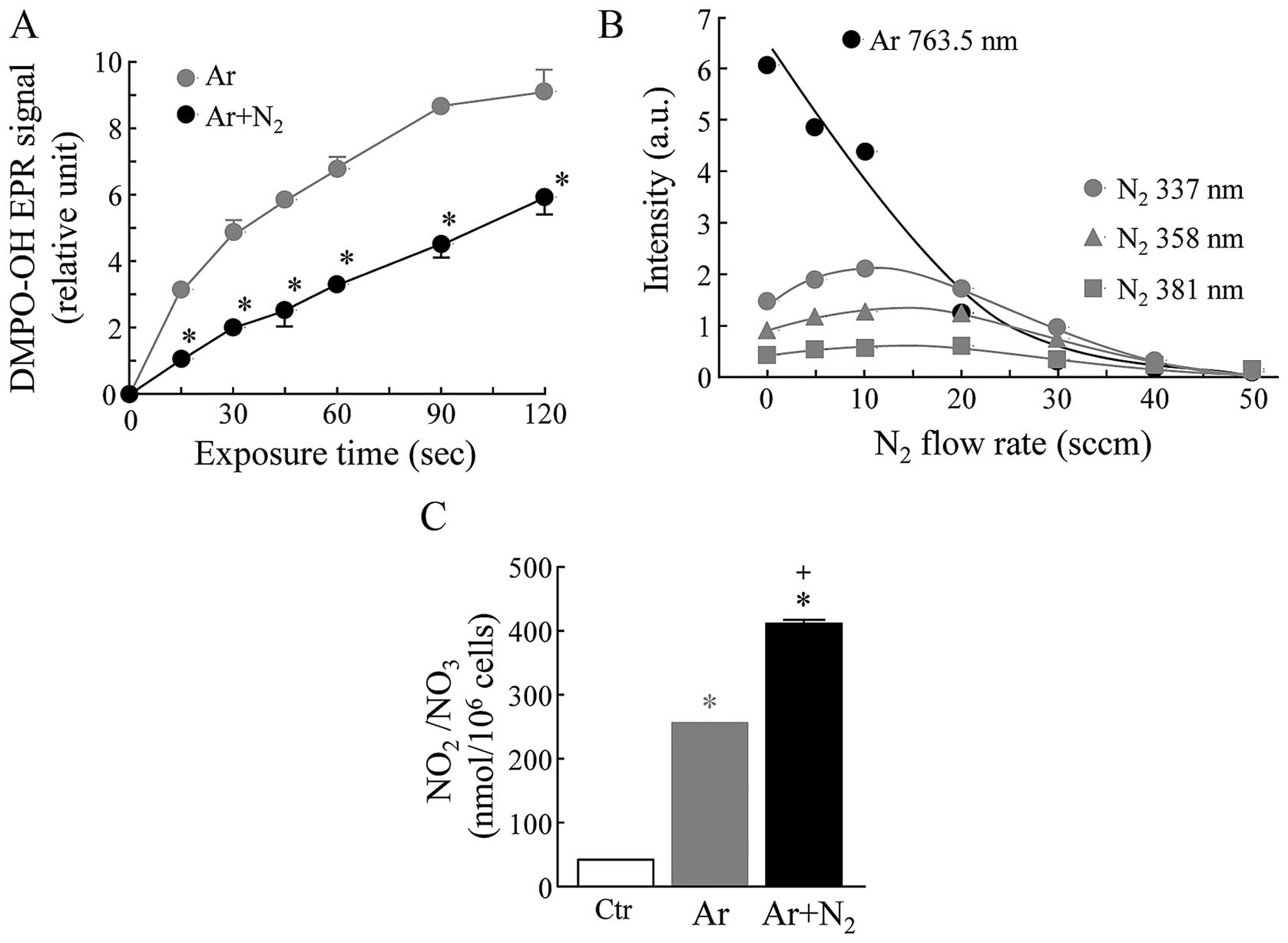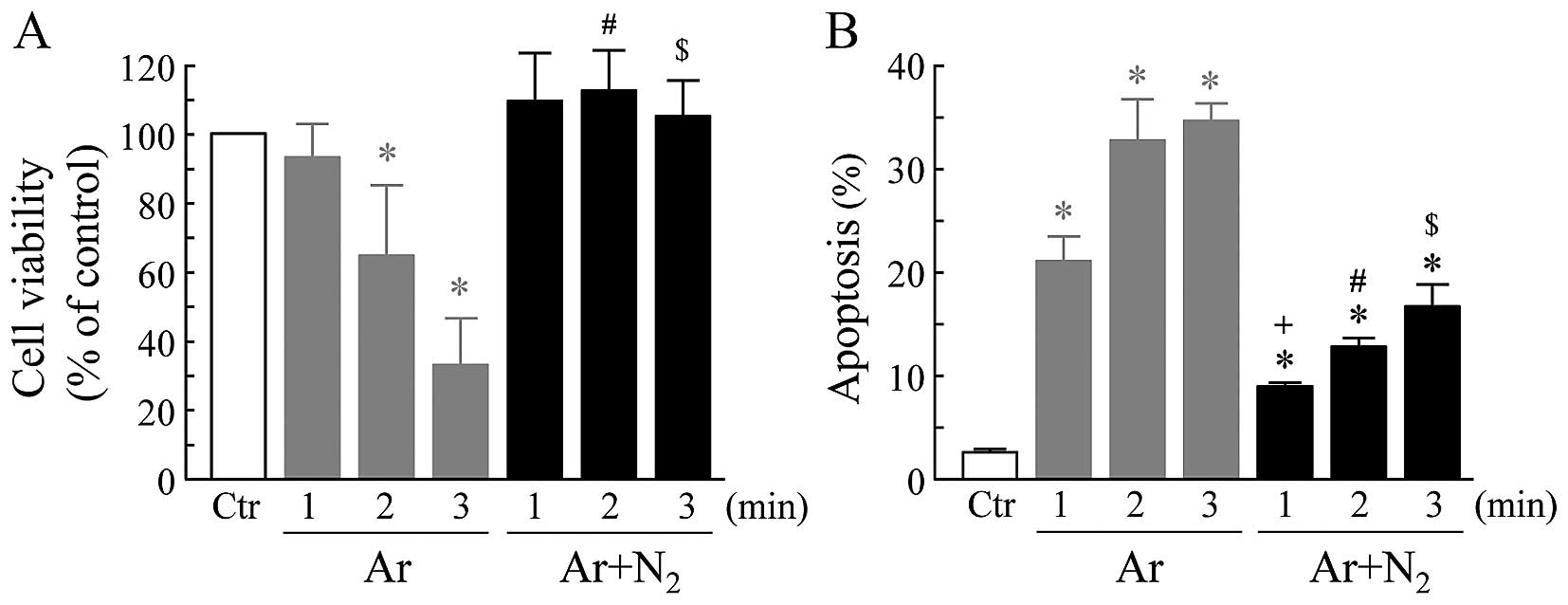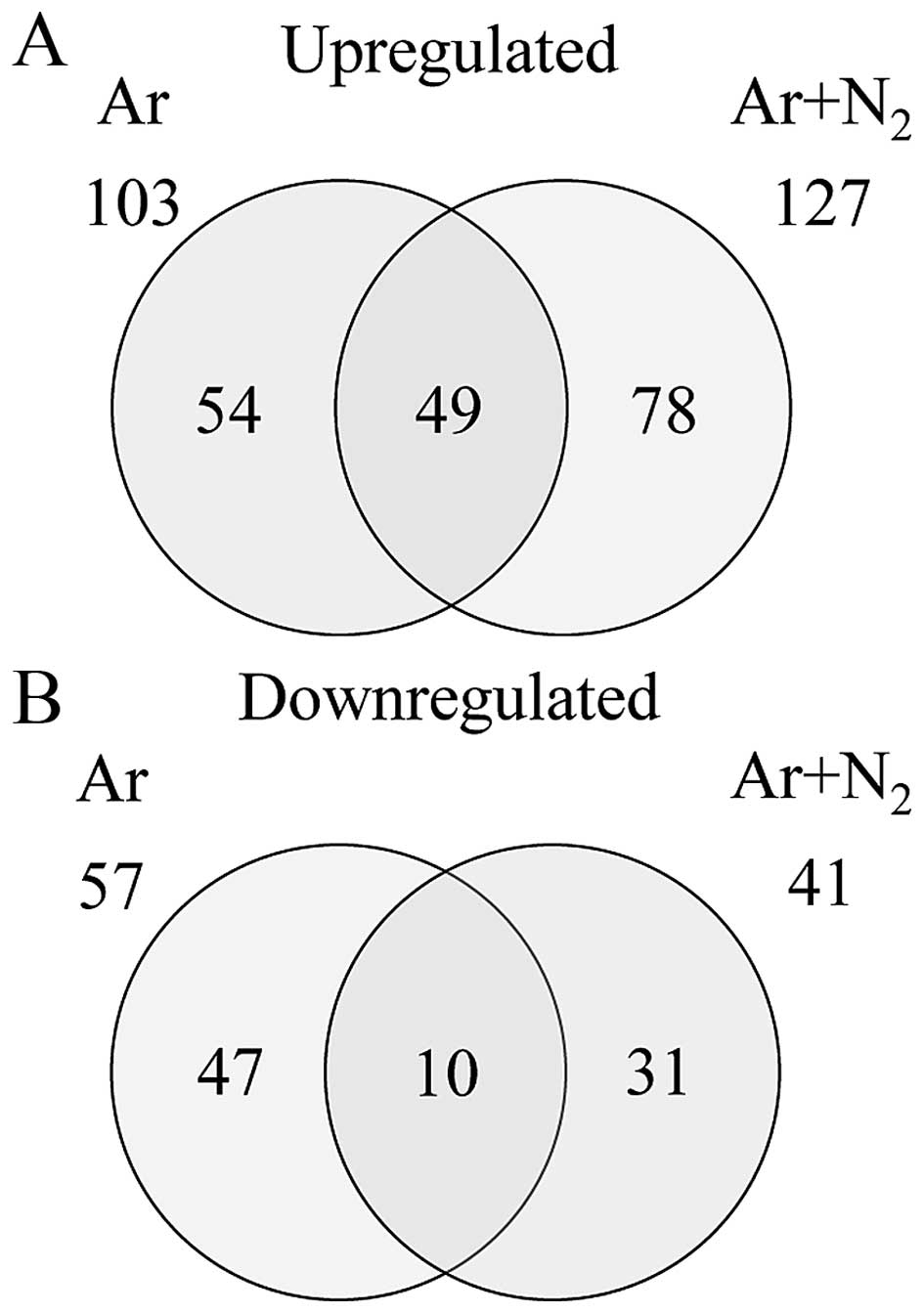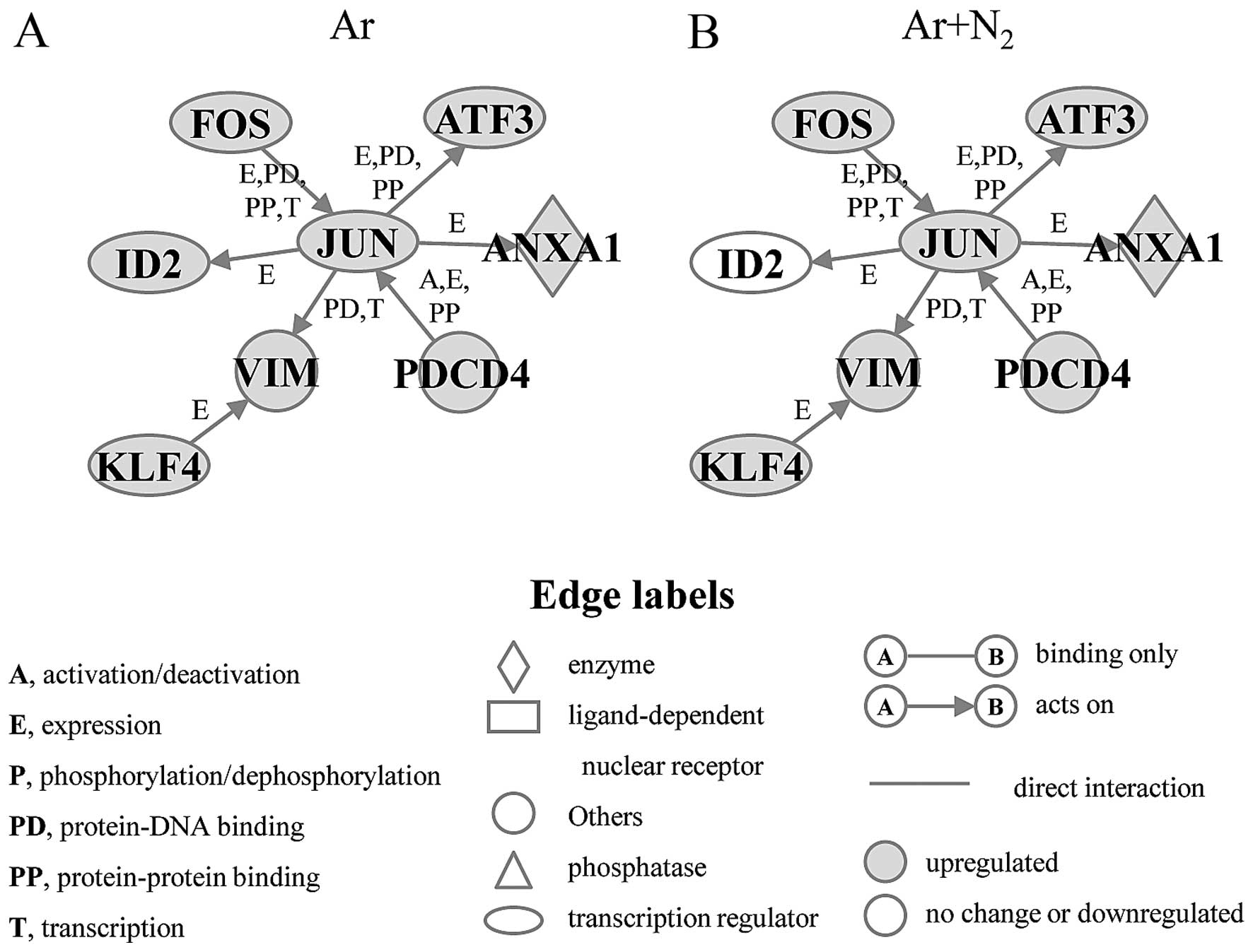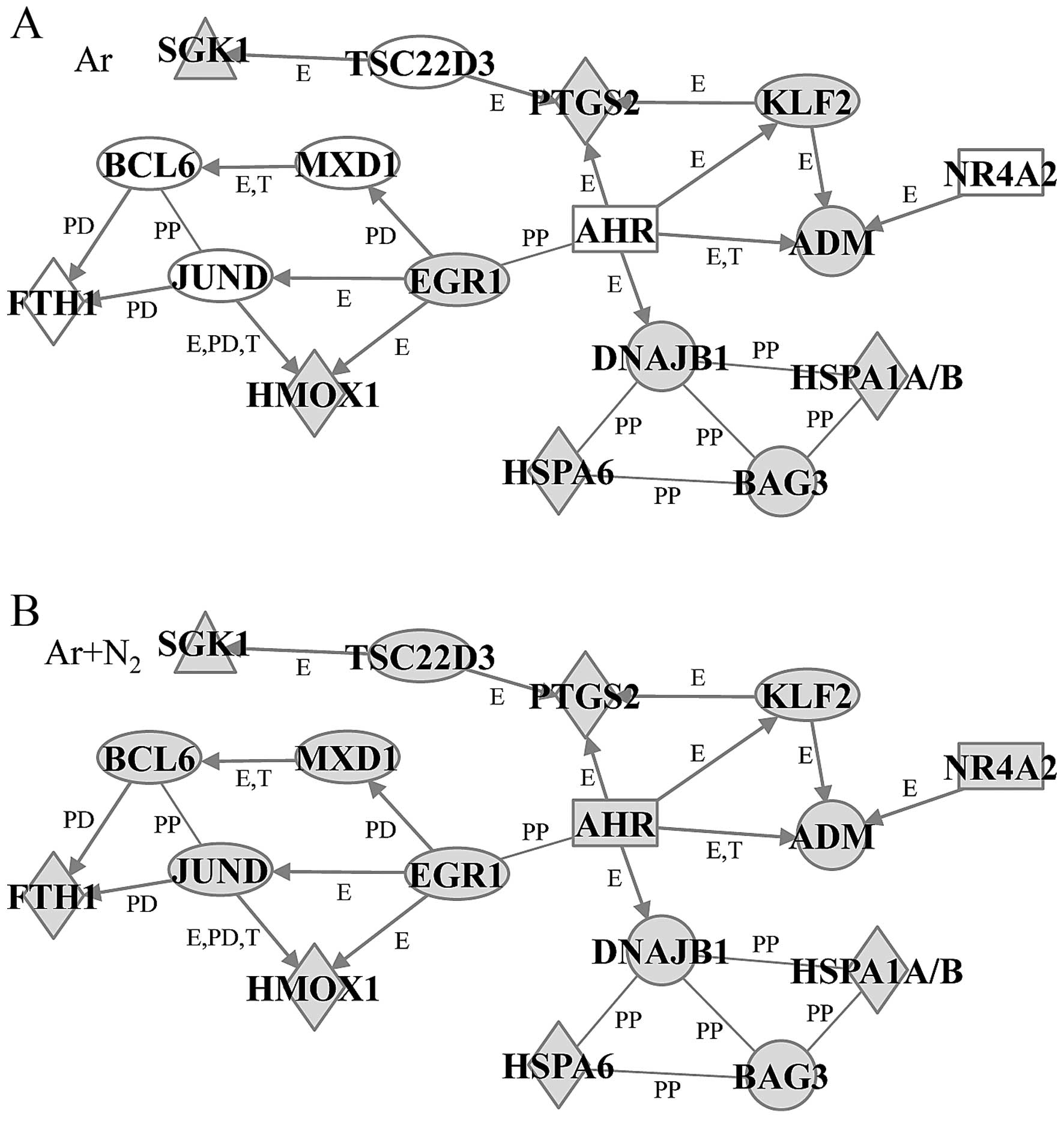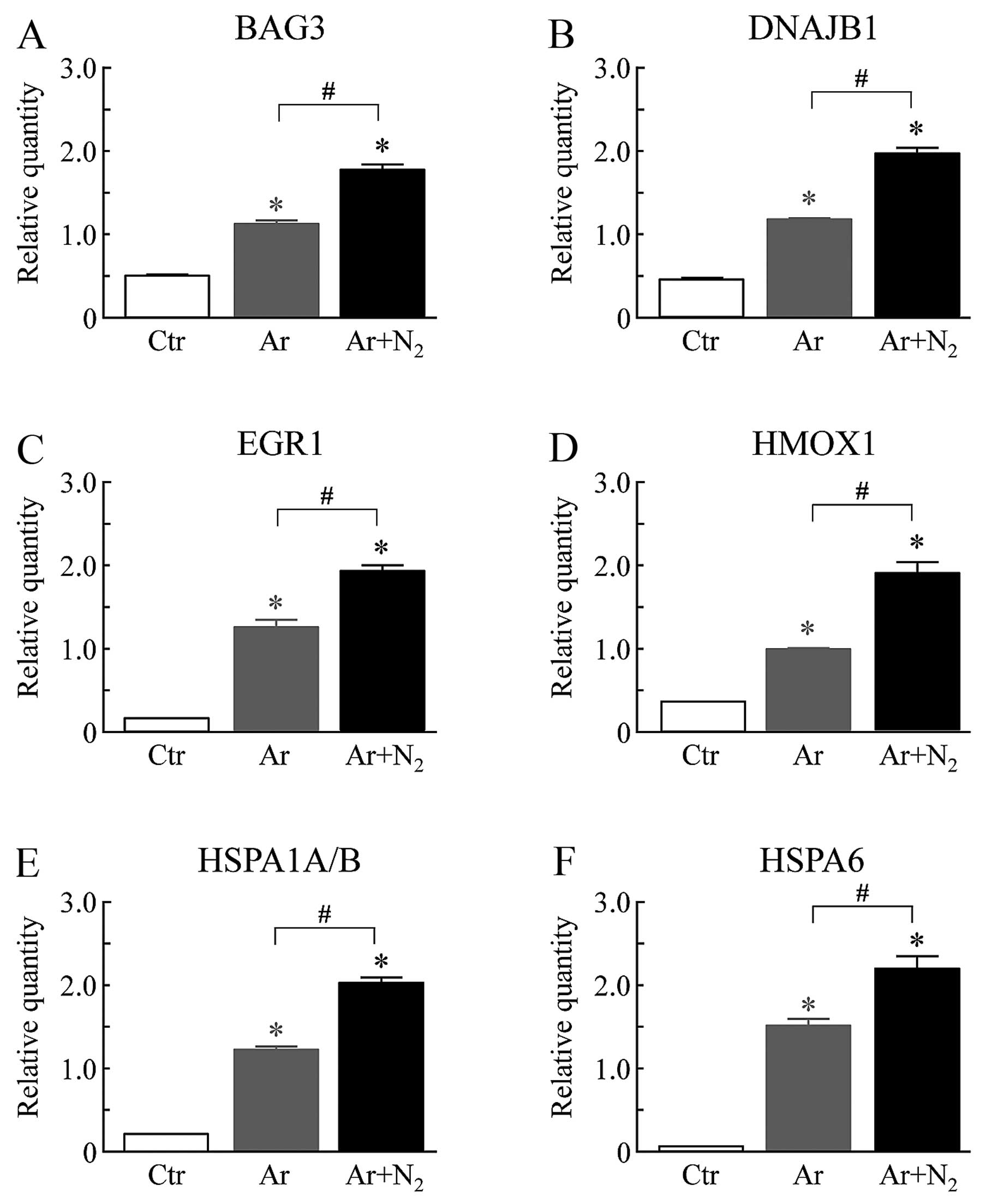|
1
|
Hoffmann C, Berganza C and Zhang J: Cold
Atmospheric Plasma: Methods of production and application in
dentistry and oncology. Med Gas Res. 3:212013. View Article : Google Scholar : PubMed/NCBI
|
|
2
|
Mai-Prochnow A, Murphy AB, McLean KM, Kong
MG and Ostrikov KK: Atmospheric pressure plasmas: Infection control
and bacterial responses. Int J Antimicrob Agents. 43:508–517. 2014.
View Article : Google Scholar : PubMed/NCBI
|
|
3
|
Arjunan KP, Sharma VK and Ptasinska S:
Effects of atmospheric pressure plasmas on isolated and cellular
DNA-a review. Int J Mol Sci. 16:2971–3016. 2015. View Article : Google Scholar : PubMed/NCBI
|
|
4
|
Isbary G, Shimizu T, Li YF, Stolz W,
Thomas HM, Morfill GE and Zimmermann JL: Cold atmospheric plasma
devices for medical issues. Expert Rev Med Devices. 10:367–377.
2013. View Article : Google Scholar : PubMed/NCBI
|
|
5
|
Joh HM, Choi JY, Kim SJ, Chung TH and Kang
TH: Effect of additive oxygen gas on cellular response of lung
cancer cells induced by atmospheric pressure helium plasma jet. Sci
Rep. 4:66382014. View Article : Google Scholar : PubMed/NCBI
|
|
6
|
Hertwig C, Steins V, Reineke K, Rademacher
A, Klocke M, Rauh C and Schlüter O: Impact of surface structure and
feed gas composition on Bacillus subtilis endospore inactivation
during direct plasma treatment. Front Microbiol. 6:7742015.
View Article : Google Scholar : PubMed/NCBI
|
|
7
|
Brun P, Brun P, Vono M, Venier P,
Tarricone E, Deligianni V, Martines E, Zuin M, Spagnolo S,
Cavazzana R, et al: Disinfection of ocular cells and tissues by
atmospheric-pressure cold plasma. PLoS One. 7:e332452012.
View Article : Google Scholar : PubMed/NCBI
|
|
8
|
Schmidt A, Dietrich S, Steuer A, Weltmann
KD, von Woedtke T, Masur K and Wende K: Non-thermal plasma
activates human keratinocytes by stimulation of antioxidant and
phase II pathways. J Biol Chem. 290:6731–6750. 2015. View Article : Google Scholar : PubMed/NCBI
|
|
9
|
Duske K, Koban I, Kindel E, Schröder K,
Nebe B, Holtfreter B, Jablonowski L, Weltmann KD and Kocher T:
Atmospheric plasma enhances wettability and cell spreading on
dental implant metals. J Clin Periodontol. 39:400–407. 2012.
View Article : Google Scholar : PubMed/NCBI
|
|
10
|
Steinbeck MJ, Chernets N, Zhang J, Kurpad
DS, Fridman G, Fridman A and Freeman TA: Skeletal cell
differentiation is enhanced by atmospheric dielectric barrier
discharge plasma treatment. PLoS One. 8:e821432013. View Article : Google Scholar : PubMed/NCBI
|
|
11
|
Hirst AM, Frame FM, Maitland NJ and
O'Connell D: Low temperature plasma: A novel focal therapy for
localized prostate cancer? BioMed Res Int. 2014:8783192014.
View Article : Google Scholar : PubMed/NCBI
|
|
12
|
Partecke LI, Evert K, Haugk J, Doering F,
Normann L, Diedrich S, Weiss FU, Evert M, Huebner NO, Guenther C,
et al: Tissue tolerable plasma (TTP) induces apoptosis in
pancreatic cancer cells in vitro and in vivo. BMC Cancer.
12:4732012. View Article : Google Scholar : PubMed/NCBI
|
|
13
|
Walk RM, Snyder JA, Srinivasan P, Kirsch
J, Diaz SO, Blanco FC, Shashurin A, Keidar M and Sandler AD: Cold
atmospheric plasma for the ablative treatment of neuroblastoma. J
Pediatr Surg. 48:67–73. 2013. View Article : Google Scholar : PubMed/NCBI
|
|
14
|
Utsumi F, Kajiyama H, Nakamura K, Tanaka
H, Mizuno M, Ishikawa K, Kondo H, Kano H, Hori M and Kikkawa F:
Effect of indirect nonequilibrium atmospheric pressure plasma on
anti-proliferative activity against chronic chemo-resistant ovarian
cancer cells in vitro and in vivo. PLoS One. 8:e815762013.
View Article : Google Scholar : PubMed/NCBI
|
|
15
|
Kalghatgi S, Kelly CM, Cerchar E, Torabi
B, Alekseev O, Fridman A, Friedman G and Azizkhan-Clifford J:
Effects of non-thermal plasma on mammalian cells. PLoS One.
6:e162702011. View Article : Google Scholar : PubMed/NCBI
|
|
16
|
Zhao S, Xiong Z, Mao X, Meng D, Lei Q, Li
Y, Deng P, Chen M, Tu M, Lu X, et al: Atmospheric pressure room
temperature plasma jets facilitate oxidative and nitrative stress
and lead to endoplasmic reticulum stress dependent apoptosis in
HepG2 cells. PLoS One. 8:e736652013. View Article : Google Scholar : PubMed/NCBI
|
|
17
|
Ahn HJ, Kim KI, Hoan NN, Kim CH, Moon E,
Choi KS, Yang SS and Lee JS: Targeting cancer cells with reactive
oxygen and nitrogen species generated by atmospheric-pressure air
plasma. PLoS One. 9:e861732014. View Article : Google Scholar : PubMed/NCBI
|
|
18
|
Thiyagarajan M, Anderson H and Gonzales
XF: Induction of apoptosis in human myeloid leukemia cells by
remote exposure of resistive barrier cold plasma. Biotechnol
Bioeng. 111:565–574. 2014. View Article : Google Scholar
|
|
19
|
Ma Y, Ha CS, Hwang SW, Lee HJ, Kim GC, Lee
KW and Song K: Non-thermal atmospheric pressure plasma
preferentially induces apoptosis in p53-mutated cancer cells by
activating ROS stress-response pathways. PLoS One. 9:e919472014.
View Article : Google Scholar : PubMed/NCBI
|
|
20
|
Kaushik N, Kumar N, Kim CH, Kaushik NK and
Choi EH: Dielectric barrier discharge plasma efficiently delivers
an apoptotic response in human monocytic lymphoma. Plasma Process
Polym. 11:1175–1187. 2014. View Article : Google Scholar
|
|
21
|
Adachi T, Tanaka H, Nonomura S, Hara H,
Kondo S and Hori M: Plasma-activated medium induces A549 cell
injury via a spiral apoptotic cascade involving the
mitochondrial-nuclear network. Free Radic Biol Med. 79:28–44. 2015.
View Article : Google Scholar
|
|
22
|
Uchiyama H, Zhao QL, Hassan MA, Andocs G,
Nojima N, Takeda K, Ishikawa K, Hori M and Kondo T: EPR-spin
trapping and flow cytometric studies of free radicals generated
using cold atmospheric argon plasma and X-ray irradiation in
aqueous solutions and intracellular milieu. PLoS One.
10:e01369562015. View Article : Google Scholar : PubMed/NCBI
|
|
23
|
Tabuchi Y, Yunoki T, Hoshi N, Suzuki N and
Kondo T: Genes and gene networks involved in sodium
fluoride-elicited cell death accompanying endoplasmic reticulum
stress in oral epithelial cells. Int J Mol Sci. 15:8959–8978. 2014.
View Article : Google Scholar : PubMed/NCBI
|
|
24
|
Furusawa Y, Tabuchi Y, Wada S, Takasaki I,
Ohtsuka K and Kondo T: Identification of biological functions and
gene networks regulated by heat stress in U937 human lymphoma
cells. Int J Mol Med. 28:143–151. 2011.PubMed/NCBI
|
|
25
|
Kariya A, Tabuchi Y, Yunoki T and Kondo T:
Identification of common gene networks responsive to mild
hyperthermia in human cancer cells. Int J Mol Med. 32:195–202.
2013.PubMed/NCBI
|
|
26
|
Kariya A, Furusawa Y, Yunoki T, Kondo T
and Tabuchi Y: A microRNA-27a mimic sensitizes human oral squamous
cell carcinoma HSC-4 cells to hyperthermia through downregulation
of Hsp110 and Hsp90. Int J Mol Med. 34:334–340. 2014.PubMed/NCBI
|
|
27
|
Finkel T and Holbrook NJ: Oxidants,
oxidative stress and the biology of ageing. Nature. 408:239–247.
2000. View Article : Google Scholar : PubMed/NCBI
|
|
28
|
Li FJ, Kondo T, Zhao QL, Tanabe K, Ogawa
R, Li M and Arai Y: Enhancement of hyperthermia-induced apoptosis
by a free radical initiator, 2,2′-azobis (2-amidinopropane)
dihydrochloride, in human histiocytic lymphoma U937 cells. Free
Radic Res. 35:281–299. 2001. View Article : Google Scholar : PubMed/NCBI
|
|
29
|
Honda H, Kondo T, Zhao QL, Feril LB Jr and
Kitagawa H: Role of intracellular calcium ions and reactive oxygen
species in apoptosis induced by ultrasound. Ultrasound Med Biol.
30:683–692. 2004. View Article : Google Scholar : PubMed/NCBI
|
|
30
|
Li P, Zhao QL, Wu LH, Jawaid P, Jiao YF,
Kadowaki M and Kondo T: Isofraxidin, a potent reactive oxygen
species (ROS) scavenger, protects human leukemia cells from
radiation-induced apoptosis via ROS/mitochondria pathway in
p53-independent manner. Apoptosis. 19:1043–1053. 2014. View Article : Google Scholar : PubMed/NCBI
|
|
31
|
Dalli J, Jones CP, Cavalcanti DM, Farsky
SH, Perretti M and Rankin SM: Annexin A1 regulates neutrophil
clearance by macrophages in the mouse bone marrow. FASEB J.
26:387–396. 2012. View Article : Google Scholar :
|
|
32
|
Hua B, Tamamori-Adachi M, Luo Y, Tamura K,
Morioka M, Fukuda M, Tanaka Y and Kitajima S: A splice variant of
stress response gene ATF3 counteracts NF-kappaB-dependent
anti-apoptosis through inhibiting recruitment of CREB-binding
protein/p300 coactivator. J Biol Chem. 281:1620–1629. 2006.
View Article : Google Scholar
|
|
33
|
Zhang X, Zhang L, Yang H, Huang X, Otu H,
Libermann TA, DeWolf WC, Khosravi-Far R and Olumi AF: c-Fos as a
proapoptotic agent in TRAIL-induced apoptosis in prostate cancer
cells. Cancer Res. 67:9425–9434. 2007. View Article : Google Scholar : PubMed/NCBI
|
|
34
|
Ruiter GA, Zerp SF, Bartelink H, van
Blitterswijk WJ and Verheij M: Alkyl-lysophospholipids activate the
SAPK/JNK pathway and enhance radiation-induced apoptosis. Cancer
Res. 59:2457–2463. 1999.PubMed/NCBI
|
|
35
|
Li Z, Zhao J, Li Q, Yang W, Song Q, Li W
and Liu J: KLF4 promotes hydrogen-peroxide-induced apoptosis of
chronic myeloid leukemia cells involving the bcl-2/bax pathway.
Cell Stress Chaperones. 15:905–912. 2010. View Article : Google Scholar : PubMed/NCBI
|
|
36
|
Newman JR and Keating AE: Comprehensive
identification of human bZIP interactions with coiled-coil arrays.
Science. 300:2097–2101. 2003. View Article : Google Scholar : PubMed/NCBI
|
|
37
|
Mils V, Piette J, Barette C, Veyrune J,
Tesnière A, Escot C, Guilhou JJ and Basset-Séguin N: The
proto-oncogene c-fos increases the sensitivity of keratinocytes to
apoptosis. Oncogene. 14:1555–1561. 1997. View Article : Google Scholar : PubMed/NCBI
|
|
38
|
Marlowe JL and Puga A: Aryl hydrocarbon
receptor, cell cycle regulation, toxicity, and tumorigenesis. J
Cell Biochem. 96:1174–1184. 2005. View Article : Google Scholar : PubMed/NCBI
|
|
39
|
Pham CG, Bubici C, Zazzeroni F, Papa S,
Jones J, Alvarez K, Jayawardena S, De Smaele E, Cong R, Beaumont C,
et al: Ferritin heavy chain upregulation by NF-kappaB inhibits
TNFalpha-induced apoptosis by suppressing reactive oxygen species.
Cell. 119:529–542. 2004. View Article : Google Scholar : PubMed/NCBI
|
|
40
|
Wang J, Yang J, Zou Y, Huang GL and He ZW:
Orphan nuclear receptor nurr1 as a potential novel marker for
progression in human prostate cancer. Asian Pac J Cancer Prev.
14:2023–2028. 2013. View Article : Google Scholar : PubMed/NCBI
|
|
41
|
Beere HM: 'The stress of dying': The role
of heat shock proteins in the regulation of apoptosis. J Cell Sci.
117:2641–2651. 2004. View Article : Google Scholar : PubMed/NCBI
|
|
42
|
Kabbage M and Dickman MB: The BAG
proteins: A ubiquitous family of chaperone regulators. Cell Mol
Life Sci. 65:1390–1402. 2008. View Article : Google Scholar : PubMed/NCBI
|
|
43
|
Evert BO, Wüllner U and Klockgether T:
Cell death in polyglutamine diseases. Cell Tissue Res. 301:189–204.
2000. View Article : Google Scholar : PubMed/NCBI
|
|
44
|
Bindu S, Pal C, Dey S, Goyal M, Alam A,
Iqbal MS, Dutta S, Sarkar S, Kumar R, Maity P and Bandyopadhyay U:
Translocation of heme oxygenase-1 to mitochondria is a novel
cytoprotective mechanism against non-steroidal anti-inflammatory
drug-induced mitochondrial oxidative stress, apoptosis, and gastric
mucosal injury. J Biol Chem. 286:39387–39402. 2011. View Article : Google Scholar : PubMed/NCBI
|
|
45
|
Yang Z, Zhuang L, Szatmary P, Wen L, Sun
H, Lu Y, Xu Q and Chen X: Upregulation of heat shock proteins
(HSPA12A, HSP90B1, HSPA4, HSPA5 and HSPA6) in tumour tissues is
associated with poor outcomes from HBV-related early-stage
hepatocellular carcinoma. Int J Med Sci. 12:256–263. 2015.
View Article : Google Scholar : PubMed/NCBI
|
|
46
|
Yunoki T, Tabuchi Y, Hayashi A and Kondo
T: BAG3 protects against hyperthermic stress by modulating NF-κB
and ERK activities in human retinoblastoma cells. Graefes Arch Clin
Exp Ophthalmol. 253:399–407. 2015. View Article : Google Scholar
|
|
47
|
Tanabe M, Nakai A, Kawazoe Y and Nagata K:
Different thresholds in the responses of two heat shock
transcription factors, HSF1 and HSF3. J Biol Chem. 272:15389–15395.
1997. View Article : Google Scholar : PubMed/NCBI
|
|
48
|
Ahn SG and Thiele DJ: Redox regulation of
mammalian heat shock factor 1 is essential for Hsp gene activation
and protection from stress. Genes Dev. 17:516–528. 2003. View Article : Google Scholar : PubMed/NCBI
|
|
49
|
Liebmann J, Scherer J, Bibinov N,
Rajasekaran P, Kovacs R, Gesche R, Awakowicz P and Kolb-Bachofen V:
Biological effects of nitric oxide generated by an atmospheric
pressure gas-plasma on human skin cells. Nitric Oxide. 24:8–16.
2011. View Article : Google Scholar
|
|
50
|
Byrne CR and Hanson PJ: Induction of heat
shock protein 72 by a nitric oxide donor in guinea-pig gastric
mucosal cells. Eur J Pharmacol. 353:117–122. 1998. View Article : Google Scholar : PubMed/NCBI
|
|
51
|
Manucha W and Vallés PG: Cytoprotective
role of nitric oxide associated with Hsp70 expression in neonatal
obstructive nephropathy. Nitric Oxide. 18:204–215. 2008. View Article : Google Scholar : PubMed/NCBI
|
|
52
|
Manucha W and Vallés P: Hsp70/nitric oxide
relationship in apoptotic modulation during obstructive
nephropathy. Cell Stress Chaperones. 13:413–420. 2008. View Article : Google Scholar : PubMed/NCBI
|















